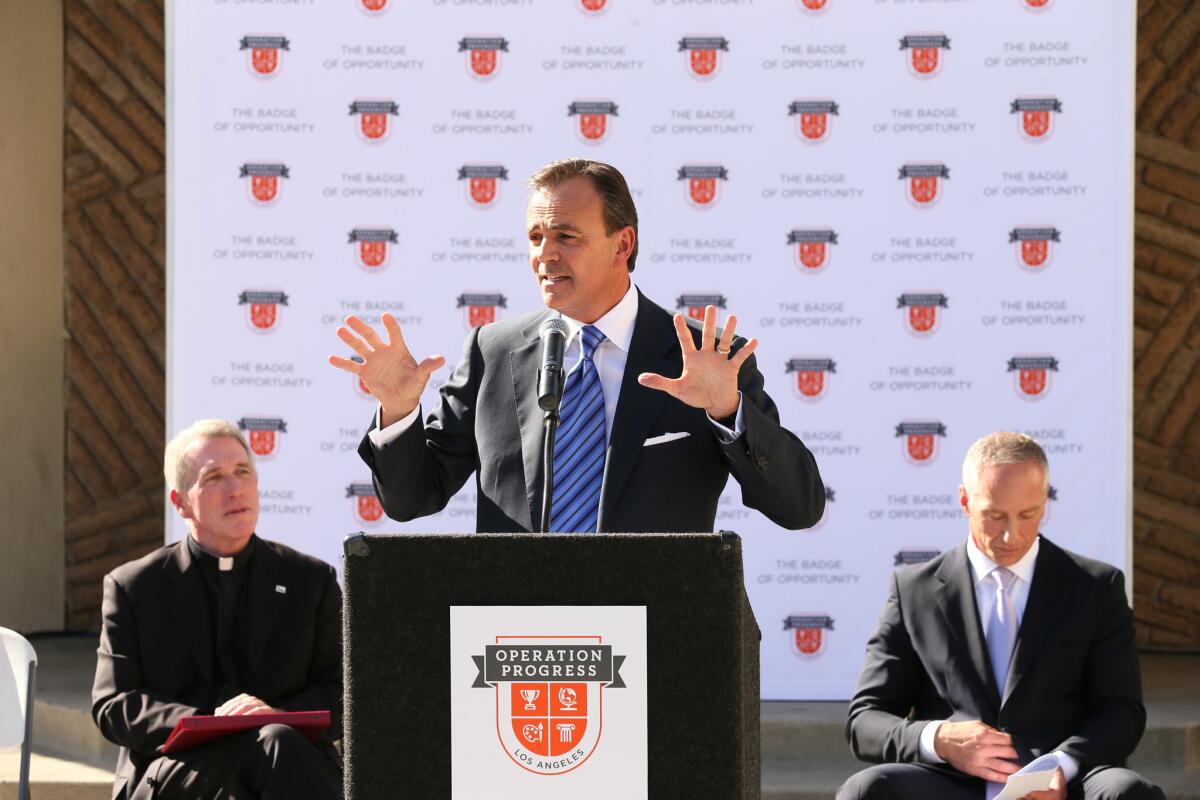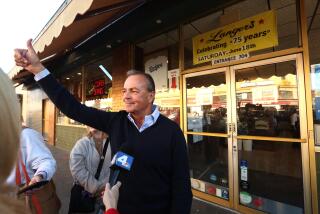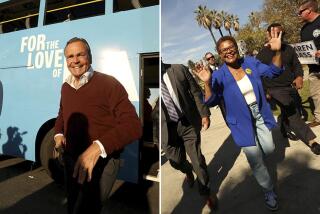How conservative and centrist business owners face — and cautiously embrace — protests

- Share via
Billionaire hotel developer and shopping center magnate Rick Caruso is one of Los Angeles’ most prominent voices of pro-business centrism, known for building luxury outdoor shopping malls and leading the boards of public institutions such as the Department of Water and Power and the Police Commission.
He demanded a new headquarters for the LAPD that was later built and has been a prominent fundraiser for Republican candidates including Mitt Romney and John Kasich.
Now Caruso has joined the voices declaring that Black lives matter.
Caruso is among the increasing number of centrist and conservative-leaning corporate leaders calling for racial justice as overwhelmingly peaceful protests have swept the country since George Floyd died while in Minneapolis police custody.
“For all lives to matter, Black lives must matter,” Caruso said. At the same time, the perennially regarded mayoral candidate unloaded criticism on unspecified Los Angeles officials who failed to prevent violence during some of the protests, including one that led to damage of Caruso’s best-known mall, the Grove.
The response to Floyd’s death has spread beyond the nation’s streets to the executive suites of big operations including Home Depot and NASCAR.
Corporations including Chick-fil-A and the NFL have come out on the side of protesters decrying systemic racism and promised to support charities that serve Black constituents. Quaker Oats Co. last week announced that it will change the name and image of its Aunt Jemima brand, which is based on a racial stereotype.
The chief executive of the manufacturer that makes Taser electronic weapons, Rick Smith, said, “All lives cannot matter, until Black lives matter.” He vowed that his company Axon will “create tools that will enable meaningful and systematic change.”
This is a rare moment of social change when historically conservative business interests are making statements that might have been seen as leftist a year ago.
It’s not the first time businesses have promised to mend their ways in moments of social upheaval, but USC economist Richard Green sees signs that changes may be more lasting this time because many bosses have been deeply affected emotionally — or at least realize that clinging to old patterns now widely seen as toxic will hurt their bottom lines.
“It’s a combination of seeing the light and seeing the money,” Green said.
Though the nation has erupted in outrage many times over the treatment of Black Americans by police, the horrifying video of Floyd’s slow death in police custody “made a whole lot of people aware of a problem they had really not preferred to think about before,” he said.
Many in corporate America had the same awakening, Green said, “that Black Americans really have to put up with things that other people don’t.”
Black Lives Matter has gone from a nascent movement with a “net negative” in public opinion polls in 2016, when 49ers quarterback Colin Kaepernick first kneeled during the national anthem to protest police violence, to having majority support in America today, the economist said, and businesses will try to keep pace with their customers’ changing viewpoints.
“My only skepticism is whether it’s permanent or not,” Green said.
Other business leaders sometimes linked with conservative stances have also made a point in recent days of supporting the change movement sweeping the country.
NASCAR this month banned Confederate flags at its events at the urging of Bubba Wallace, NASCAR’S only Black full-time driver.
In a public letter, Chick-fil-A Chief Executive Dan Cathy called the killings of George Floyd and many other Black men “horrifying” and outrageous. He said the company — which last fall promised to stop donating to charities with histories of opposing same-sex marriage — had bolstered its financial investments in the redevelopment of the Westside of its home city of Atlanta, and supports nonprofit services serving the Black community including historic Morehouse College.
Home Depot Chief Executive Craig Menear called the recent killings part of a pattern of racism that reflects “the harsh reality that as a nation we are much too far from fulfilling the promise of equal justice for all.” Home Depot is contributing $1 million to the Lawyers Committee for Civil Rights Under Law, he said.
Home Depot has sought to distance itself from billionaire co-founder Bernie Marcus after he pledged to back President Trump’s bid for reelection in 2020, NPR reported. Marcus also contributed to Trump’s 2016 election campaign.
NFL Commissioner Roger Goodell released a minute-long video on social media June 5 saying the league was “wrong” for not listening to players earlier about inequality and police misconduct, and encouraging “all to speak out and peacefully protest.”
He added, “We, the National Football League, believe Black lives matter.”
Like many other business leaders, Caruso made a point of supporting the cause of demonstrators who have been marching in the streets to protest racism. In a letter to residents of Los Angeles that was published in The Times, Caruso said he is “anguished by the brutal death of George Floyd” and said that the country has failed to live up to its ideals of equality.
“The fundamental truth of human equality is destroyed by a racism that is woven into the fabric of this country: in order for all lives to matter, Black lives must matter,” he said. “People of color face systemic challenges to fair application of the law, equal pay, housing and healthcare in this country.”
Caruso’s statements on the protest movement carve out a cautious perspective. He praises the ideas behind it while excoriating unnamed public officials in charge when the Fairfax district was the site of property damage on May 30, including hundreds of thousands of dollars worth of damage at the Grove, which saw smashed windows, burglarized stores and a police kiosk set on fire.
Caruso declined to identify the public leaders he said failed in their duties, but said he has made his judgment known to them.
“Their overwhelming statement that was made to me was, ‘I am doing the best I can do.’ And my response was, ‘If this is the best you can do, you should not be in office. The city deserves better.”
“You had a sacred duty to protect the residents of this city and you failed. And you had a sacred duty to protect the protesters and you failed. You had a sacred duty to protect the Black community and you failed.”
Caruso said he does not support calls to “defund” the police, which he called “pandering on the part of leadership, and it will only hurt the Black community.” Mayor Eric Garcetti has said he will seek up to $150 million in cuts to the LAPD budget.
Caruso’s two-year tenure as Police Commission president was marked by some controversy, including an allegation that he called Rep. Maxine Waters (D-Los Angeles) a “bitch” — which he denies. But Caruso helped reshape the commission into a panel independent enough to block Bernard C. Parks from a second term as LAPD chief, which was an unpopular move in the Black community.
Caruso, who registered to vote with no party preference, said a little over half of the more than 1,000 employees at his company are not white, and that 41% of managers are not white. About half of his employees are women.
The developer and landlord, who is also chairman of the USC Board of Trustees, said he will contribute $5 million over the next three years to educational programs for students he has been supporting in southern Los Angeles through Operation Progress L.A. and SCS Noonan Scholars.
He said he will also form a coalition of leaders “to demand a social justice reform bill that will forever transform our state.” Among those he has consulted so far are civil rights lawyer Connie Rice and Los Angeles Urban League President Michael Lawson.
Lawson said in an interview that now “is a time to take a hard look at the institutions that have been really the vestiges of oppression,” such as the police force, schools and healthcare. “The list is long,” Lawson said.
He also prodded company leaders to do better, even as many known for conservative stances in the past voice support for the goals of the Black Lives Matter movement.
“The business community has to understand that looking only at your bottom line is not sufficient,” Lawson said. “There needs to be a comprehensive reorientation of our values.”
Green said he hoped decision-makers in business can muster the sustained will to make meaningful changes by bringing more minorities into senior ranks and making sure they can buy homes and businesses.
“We have had a long history of making it harder to own things for Black people than other people,” Green said. “This country has such a short attention span. I just hope we keep this in front of us until it’s fixed, and it’s going to be a long time.”
More to Read
Inside the business of entertainment
The Wide Shot brings you news, analysis and insights on everything from streaming wars to production — and what it all means for the future.
You may occasionally receive promotional content from the Los Angeles Times.











